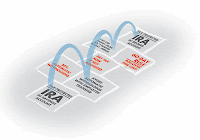 A required minimum distribution (RMD) cannot be rolled over. And, the first funds out of a retirement account are considered the RMD.
A required minimum distribution (RMD) cannot be rolled over. And, the first funds out of a retirement account are considered the RMD.
All distributions from an employer plan are considered rollovers, even when the funds go directly from the employer plan to another plan, to an IRA or to a Roth IRA. Before you move funds from an employer plan to another retirement account, you must take any RMDs that remain in the plan. There are no exceptions to this rule.
All conversions to a Roth IRA are treated as rollovers, even when the funds go directly from one retirement account to the Roth IRA. Before you do a Roth conversion, you must take any RMDs that remain in the account. Again, there are no exceptions to this rule.
An IRA is treated a little bit differently. Here a rollover is when the account owner can use the funds while they are out of the IRA. A direct transfer from one IRA to another is not considered a rollover. So you can do a direct transfer of an RMD from one IRA to another IRA, even if the funds are going from a deceased account owner’s IRA to a beneficiary’s IRA. You need to be sure that the RMD is taken before year-end from the receiving account.
A rollover of an RMD is treated as a contribution to the receiving account. If you are not eligible to make a contribution or if the RMD amount is more than the contribution limit for the year, then you have an excess contribution in the receiving account.
Next week - how to fix the excess contribution. And, no, you cannot just leave the excess there.
-By IRA Technical Consultant Beverly DeVeny and Jared Trexler
No Rollover For Required Minimum Distributions
Friday, October 28, 2011
No comments
Mailbag
Thursday's Slott Report Mailbag

Consumers: Send in Your Questions to [email protected]
Q:
Is a monthly retirement check considered income in order to open a Roth IRA?
A:
An IRA contribution must be based on the taxable compensation of the individual for the year of the contribution. Pension, profit sharing or IRA distributions are not considered compensation for the purpose of a contribution to an IRA. Here is a Q&A; article we did on Roth IRA and IRA contributions.


 Articles That Move
Articles That Move







0 comments:
Post a Comment